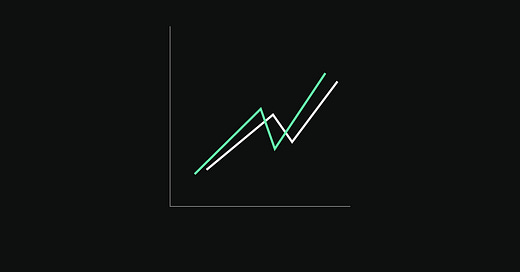Correlation vs. Causation
The Idea
What goes together doesn't have to be caused by one another.
Graphs of different trends combined into one visual can be a powerful tool to spread a message of "this causes that" — and as such, correlations are often being used in the news, in business and elsewhere to make explicit or implicit statements about cause-and-effect relationships.
However, just because two phenomena occur together doesn't mean that one causes the other — correlations without context and nuance often suggest the opposite, though. When we see a statistic and hear commentary like "you can see it here; whenever A increases, B also goes up", we instinctively default to the assumption that A must be the reason for B. This instinct can be used to convince us of relationships and causalities that aren't really there.
For instance, every summer, the amount of ice-cream sold goes up, and so do the cases of severe sunburn. If we looked at a graph of both ice-cream and sunburn, one might say "you can see it here: whenever ice-cream consumption increases, the cases of severe sunburn also go up."
It is obvious to most that this particular correlation is not causative, i.e. ice-cream doesn't cause sunburn. But with many other topics discussed in politics, business and the media, it is not so obvious and correlations can quickly become causations in our minds if we aren't intentionally mindful of the correlation-causation difference.
A major reason for that correlations we observe shouldn't be interpreted as causations are so called common-causal variables. These are factors we don't account for in our analysis that influence the trends we look at. In our case, the sun causes both more ice-cream consumption and more sunburn. It influences both factors we look at and if we don't account for it, we might think that the factors themselves are related.
Other reasons for the correlation-causation fallacy include reverse causalities, bi-directional causation or simply coincidental relationships.
“One of the first things taught in introductory statistics textbooks is that correlation is not causation. It is also one of the first things forgotten.”
— Thomas Sowell
Resources
🎥 This video makes it easy to understand the concept in a real-life context with great examples.
🎥 For an introduction to the basic statistical technicalities (important!), check out this video.
📝 This Wikipedia article gives an insightful and valuable introduction to correlation vs. causation.
📚 Daniel Kahnemann’s Thinking, Fast and Slow
📚 Hans Rosling’s Factfulness
📚 Nassim Taleb’s Fooled By Randomness
📝 Blog: Farnam Street
🎙 Podcast: You Are Not So Smart
📝 MindVault: The Plausibility Bias
📝 MindVault: Signal vs. Noise




